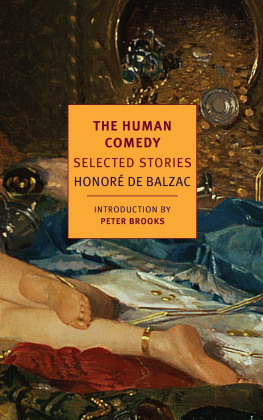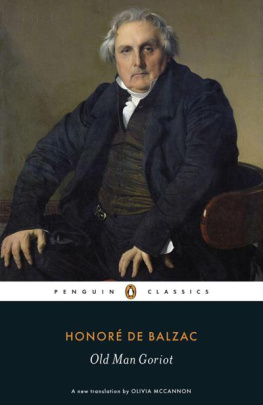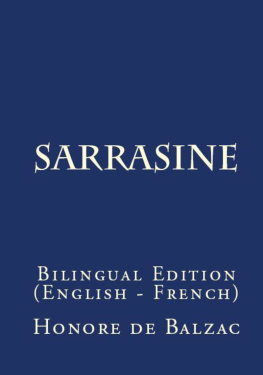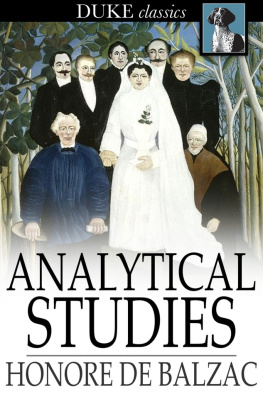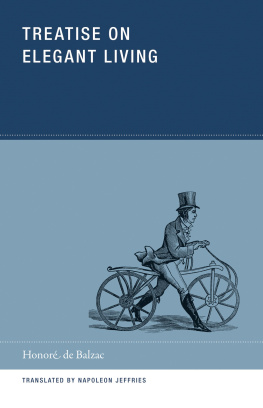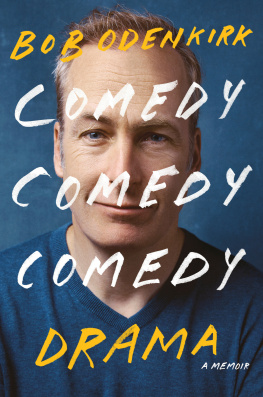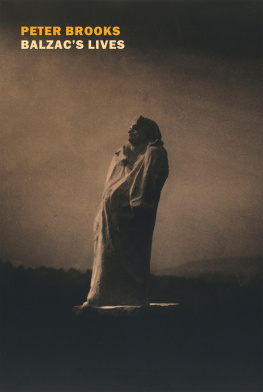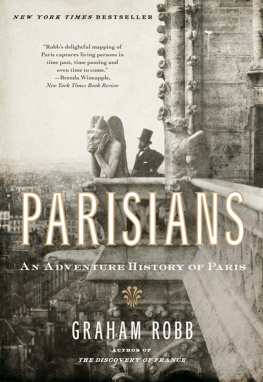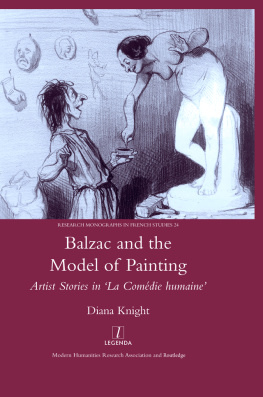HONOR DE BALZAC (17991850), one of the greatest and most influential of novelists, was born in Tours and educated at the Collge de Vendme and the Sorbonne. He began his career as a pseudonymous writer of sensational potboilers before achieving success with a historical novel, The Chouans. Balzac then conceived his great work, La Comdie humaine, an ongoing series of novels in which he set out to offer a complete picture of contemporary society and manners. Always working under an extraordinary burden of debt, Balzac wrote some eighty-five novels in the course of his last twenty years, including such masterpieces as Pre Goriot, Eugnie Grandet, Lost Illusions, and Cousin Bette. In 1850, he married Eveline Hanska, a rich Polish woman with whom he had long conducted an intimate correspondence. Three months later he died. In addition to the present collection, NYRB Classics publishes a translation of Balzacs The Unknown Masterpiece and Gambara.
PETER BROOKS taught for many years at Yale, where he was Sterling Professor of Comparative Literature. He has written about Balzac in a number of books, including The Melodramatic Imagination, Reading for the Plot, Henry James Goes to Paris, and Enigmas of Identity. He is currently Andrew W. Mellon Scholar at Princeton and is at work on Flaubert in the Ruins of Paris.
LINDA ASHER has translated works by Milan Kundera, Georges Simenon, Victor Hugo, Jean-Pierre Vernant, Restif de la Bretonne, and many others. A former fiction editor at The New Yorker, she has been awarded the French-American Foundation, Scott Moncrieff, and ASCAP Deems Taylor translation prizes and is a Chevalier of the Order of Arts and Letters of the French Republic.
CAROL COSMAN is a translator of French literature and letters. Her work includes Exile and the Kingdom by Albert Camus, Colonel Chabert by Honor de Balzac, America Day by Day by Simone de Beauvoir, The Elementary Forms of Religious Life by Emile Durkheim, and The Family Idiot (a study of Flaubert) by Jean-Paul Sartre.
JORDAN STUMP is a professor of French at the University of NebraskaLincoln; the author, most recently, of The Other Book: Bewilderments of Fiction; and the translator of some twenty works of (mostly) contemporary French prose by authors such as Marie NDiaye, Eric Chevillard, Antoine Volodine, and Jean-Philippe Toussaint. His translation of Claude Simons The Jardin des Plantes won the French-American Foundations annual translation prize in 2001.
THE HUMAN COMEDY
Selected Stories
HONOR DE BALZAC
Edited and with an introduction by
PETER BROOKS
Translated from the French by
LINDA ASHER
CAROL COSMAN and
JORDAN STUMP
NEW YORK REVIEW BOOKS

New York
THIS IS A NEW YORK REVIEW BOOK
PUBLISHED BY THE NEW YORK REVIEW OF BOOKS
435 Hudson Street, New York, NY 10014
www.nyrb.com
Copyright 2014 by NYREV, Inc.
Introduction copyright 2014 by Peter Brooks
Translation copyright 2014 by Linda Asher, Carol Cosman, and Jordan M. Stump
All rights reserved.
Cover image: Della Rocca, An Embarrassment of Riches (detail); The Bridgeman Art Library
Cover design: Katy Homans
Library of Congress has cataloged the earlier printing as follows:
Balzac, Honor de, 17991850.
[Comdie humaine. Selections. English]
The human comedy : Selected Stories / By Honor de Balzac ; edited and with an introduction By Peter Brooks ; [translated By] Linda Asher, Carol Cosman, Jordan Stump.
pages cm. (New York Review Books Classics)
ISBN 978-1-59017-664-1 (pbk.)
I. Brooks, Peter, 1938- editor of compilation. II. Asher, Linda, translator. III. Title.
PQ2161.W813 2014
843'.7dc23
2013026922
ISBN 978-1-59017-698-6
v1.0
For a complete list of books in the NYRB Classics series, visit www.nyrb.com or write to: Catalog Requests, NYRB, 435 Hudson Street, New York, NY 10014.
CONTENTS
INTRODUCTION
H ONOR DE BALZAC is known for immensity, excess, all-night writing sessions in his monks robe sustained by countless cups of coffee, producing more than ninety novels and tales in the space of some twenty years. Rodins great, looming sculpture suggests a visionary who wanted to capture the whole of French society of his time, and more: the forces that animated it, the principles that made its wheels spin.
It may seem a paradox, then, to link Balzacs vast Human Comedy to the adjective short. We think of Balzac as long, often too longdescriptions, explanations that correspond to the leisure associated with reading nineteenth-century novels, of a length for evenings without television or smartphones. His novels are often freighted with extended presentations of things and people, and weighty excurses on every imaginable subject. He was one of the first generation of writers to make a living from his work, and the need to generate ever more of itsince he was usually in debtdrove his pen. He produced masterpieces nonetheless, though not of the chiseled, perfect sort sought by Flaubert, for instance. Balzacs claim lies rather in his capacity to invent, to imagine, to create literally hundreds of characters capable of playing out their dramas with convincing power. He stands as the first true realist in his ambition to see society as an organic system. Oscar Wilde came close to the heart of the matter when he declared: The nineteenth century, as we know it, is largely an invention of Balzacs. Balzac invents the new century by being the first writer to represent its emerging urban agglomerations, its nascent capitalist dynamics, its rampant cult of the individual personality. By seeing and dramatizing changes that he mainly deplored, he initiated his readers into understanding the shape of the century. Balzacs great glory is that he pretended hardest, declared his faithful disciple Henry James: In the art of make-believe, Balzac was the master.
Yet interspersed among the ninety-odd titles that make up The Human Comedy are a number of short stories and novellas that are among the best work Balzac did. Here he produces his striking effects, his thunderous climaxes, his acute psychological twists with greater economy than in the full-length novels. And he uses short fiction to try out some of his boldest imaginative flights. Here is the place to dramatize extremes of emotion: the loss of self in madness, artistic creation, and passion; the inventive forms taken by vengeance; the monomania of the artist; and, especially, the wilder shores of love, whether of a duchess, a castrato, or a panther. Somehow the short form works to liberate Balzacs imagination from the need to be the secretary of society, as he put it. Not that society is missing here but rather that it, too, is given in its essence: as the conversation and interaction of social beings. In fact, Balzacs short fiction tends to be extraordinarily fixed on the moment of oral exchange, on the telling of and the listening to stories. In this manner he renews an age-old tradition of oral storytelling, now given a new and knowing form. These stories, which often show us humanity in extreme situations, are also about the power of storytellingand about the effect of that power on those listening.
Take for instance Another Study of Womankind, which opens at two oclock in the morning. Flicit des Touches, herself a novelist, has asked the finest minds in her already select group of friends to linger after one of her large evening gatherings. The narrator, one of these chosen few, describes the scene:

